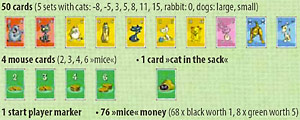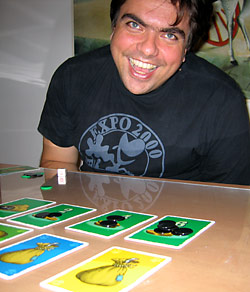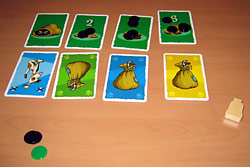| Author | Friedemann Friese |
| Publisher | 2F-Spiele |
| released | 2007 |
| players | 3-5 |
| game length | 15 minutes |
| rating |   
 
 
   |
|
|
||||||||||||
|
reviewed by Aaron Haag
Unless we are playing a very long "whole evening" type of game almost none of our game sessions is ending without playing an "Absacker" (nightcap or filler) game. These are short, light, easily taught games which nevertheless provide sufficient replay value to have them on the table again and again. If you have had a look at our session reports you will have noticed that our most favourite "Absacker" is "Liar's Dice" or "Bluff" as the German edition is called. Other favourites are "Take 6" (6 nimmt) or "Bottle Imp" (Flaschenteufel). What all of these games have in common is their short playing time, which let's you easily play at least one "revenge" game during the remaining 30 minutes or so. Also, all of these games provide very good player interaction and challenges although being based primarily on elements of luck, thus they are not too serious or dry games overall.
"Felix - The Cat in the Sack", this year released on the "Spiel 2007" by Friedemann Friese is a bidding game where sets of cards are auctioned. The catch is that players are bidding on the virtual cat in the sack, i.e. a number of cards the value of which they cannot determine right away. Without wanting to go too much into the details of the rules (they can be read here) the principle is as follows:
 |
An important design element of "Felix" is the fact that two of the cat cards have a negative value, making it possible to bid money on a stack of cards with a negative total. In addition, three special cards (a "0" valued rabbit and two dogs voiding the highest or lowest valued cat in the stack, respectively) and the fact that before the game commences every player has randomly removed one of his hand cards make the evaluation of the probable total sum of the stack even more difficult.
Let's look at some typical scenarios in the game:
As a start player your first problem is which card to place on the table. As this is the only card that is revealed before the bidding starts you are actually able to exert some control over what will happen in the first bidding round. If you play a negative card you may create an avalanche of passes by the other players if they played cards of low values, too. The effect is that all players except yourself receive some "passing" money while you are left with paying the bid and taking a possible low valued (or even negative) set. Something you surely want to avoid.
 |
On the other hand, if the next player does not pass he most probably has played a high valued card. In this situation you are "safe" as you are not the last bidder if everybody else should pass and you have a choice of either taking the highest "pass" money or continue the bidding if the now open cards suggest so.
So there is a bit of "Liar's Dice" feeling in "Felix" as well, where you want to create a situation where the player to your right is continuing the bidding if the overall situation is still unclear due to the many face down cards. Seating order plays an important role here because bluffing the player on your left on his own card obviously is a lot harder than bluffing him on someone else's card. Therefore "passing avalanches" most of the time happen, when a player's own card is the first one face down.
Another very nice game element is what I would call the "cash flow dilemma". Whenever you raise your bid you not only have to consider the potential value of the set of cards you bid on against the amount of "passing" money you get when you drop out. It is equally important to consider that high bids will render you short of cash in the next round. Paying 15 mice money for a set of value 25 may sound better than taking 6 "passing" money but if you are left with only a couple of mice after that you have just kicked yourself out of the bidding in the next (or even more) round. A situation we have seen several times and learnt that it hard to recover from.
 |
This may sound very abstract but when you play the game you will immediately feel the tension created by the seating order, the current cash situation of yourself and the other players and the cards already revealed.
Although the game mechanics are completely different, playing "Felix" also reminds me a little of "Take 6" as it creates the feeling that one has some control over the game only to determine at the end of a round that one should have played it differently. And while it is so obvious to determine afterwards what went wrong it doesn't really help to win the next game.
Coming back to my initial words about filler games I can strongly recommend "Felix" as just that: an easily explained, short game with lots of player interaction, or should I say player chaos? If you like games which create the sense of being in control but demonstrate to you again and again that you are not "Felix" can be equally addictive as "Liar's Dice", "Bottle Imp" or "Take 6".
| add/read comments |
©2007, Westpark Gamers